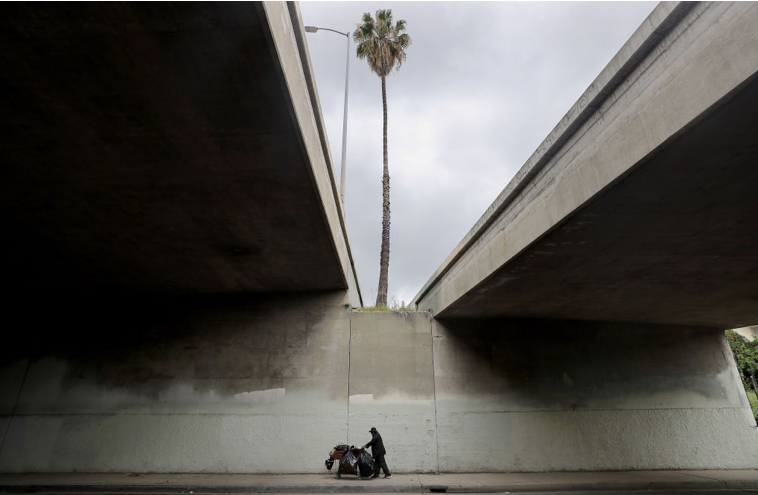CommentsDEATH WATCH-Los Angeles reports that its county’s low-income COVID deaths are triple the number of those of wealthier neighborhoods.
Over the past month, data compiled at several coronavirus hotspots have suggested certain risk factors that may lead to higher rates of infection and death due to COVID-19. The latest numbers from Los Angeles County put the data into the broader context that some social advocates have been trying to hammer home for weeks.
The greatest vulnerability, in the time of this pandemic, is being poor.
Delivered on Sunday, the statistics from the Los Angeles County Public Health Department were stark: Individuals living in the county’s lower-income communities are three times more likely to die from COVID-19 than those living in wealthier neighborhoods.
LA County, the nation’s most populous at more than 10 million, recorded a rate of 16.5 deaths per 100,000 people in communities where at least 30 percent of the residents lived in poverty. (By the U.S. Census Bureau’s calculation, the poverty threshold for a family of four is set at an annual combined income of less than $25,701.) In communities where fewer than 10 percent of the residents lived in poverty, the rate was 5.3 deaths per 100,000, the department’s report said.
“As we have more information about who is dying, we are reminded that the work ahead requires that we address issues of disproportionality that result in higher rates of death among African Americans, Latinx and Asians as well as residents living in poverty,” Barbara Ferrer, the county’s director of public health, said in a statement accompanying the statistical release. “Ensuring access to testing, early treatment and care, and economic support among those communities at higher risk of devastating outcomes associated with COVID-19 is essential.”
When Detroit, Chicago and New Orleans, among other urban centers, began reporting infections and deaths of black residents from COVID-19 that were well out of proportion to their percentage of the overall population in those cities, experts were quick to point out that living and working conditions are inseparable from those numbers. Chicago’s black communities, for example, tend to be poorer than the city at large, with crowded living conditions and limited or no access to medical care.
But despite such evidence, a national consensus on the topic has been difficult to achieve, in part because so many states and municipalities haven’t published detailed demographic or racial breakdowns of coronavirus cases. Of more than 950,000 cases in the U.S. documented by the Centers for Disease Control and Prevention, fewer than 33 percent have been broken down by race.
A bicameral congressional effort to address that gaping statistical hole is under way. Introduced by Sens. Elizabeth Warren (D-Mass.) and Kamala Harris (D-Calif.), among others, the bill would require the Department of Health and Human Services to break down COVID-19 testing, treatment and fatality rates by race, socioeconomic status, ethnicity and several other demographic categories.
In LA County, black people continued to see the highest death rate from COVID-19, with 13 deaths per 100,000 people. That compared with a rate of 9.5 for Latino people, 7.5 for Asian people and 5.5 for white people, the department’s news release said. Proportionally, Latino residents accounted for 37 percent of the county’s deaths, whites 28 percent, Asian people 18 percent and African Americans 14 percent.
* * *
You may well need The Check. But you also need it to reach you safely. And that is more complicated than a simple government issuance would seem.
Some of the neediest Americans in line for federal stimulus money may also be the most susceptible to being defrauded out of it, according to tax and cybersecurity experts interviewed by National Public Radio. Its report found that among those who earn so little (less than $12,200 annually) that they don’t have to pay taxes, the government requires only the most basic information to verify their identities before distributing a stimulus check.
“I was a little shocked to see that,” cybersecurity expert Brian Krebs told NPR. Krebs said the only information required of those who did not file a tax return was a name, date of birth, Social Security number, address and phone number – all of which could be obtained from the Internet by an unscrupulous operator with a few bucks to spend.
Although there is no documented evidence of such theft yet, an information technology expert told NPR it likely already has occurred. The IRS, while not addressing the specific vulnerability, said it was actively working to prevent scams and was prioritizing investigations into those who prey on vulnerable taxpayers.
(Mark Kreidler is a California-based writer and broadcaster, and the author of three books, including Four Days to Glory. This piece appeared in Capital & Main.) Prepped for CityWatch by Linda Abrams















